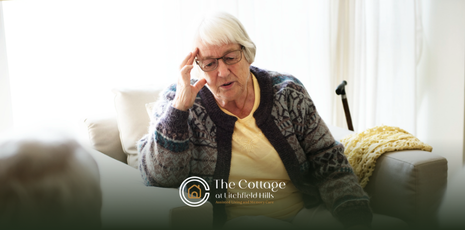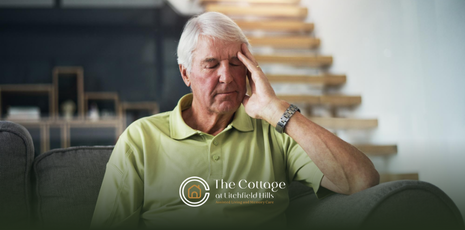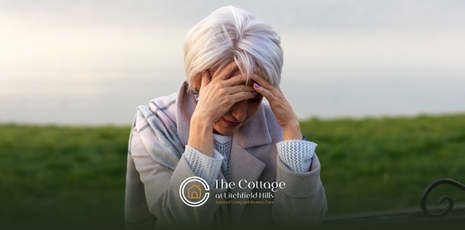Recognizing Signs of Heat Exhaustion in Seniors: A Summer Guide

Summer in Torrington, Connecticut, is a beautiful season filled with sunshine, outdoor activities, and warm evenings. But with rising temperatures, seniors are particularly vulnerable to heat-related illnesses such as heat exhaustion. Understanding how to recognize the signs of heat exhaustion in seniors is crucial to preventing serious health complications.
In this guide, we’ll walk you through what heat exhaustion is, why seniors are at greater risk, the symptoms to watch for, and effective prevention and treatment strategies. Whether you’re a caregiver, family member, or want to be informed, this blog will provide clear, practical information to help keep your elderly loved ones safe during the summer months.
What Is Heat Exhaustion?
Heat exhaustion is a heat-related illness caused by excessive heat and dehydration. It occurs when the body cannot cool itself effectively, leading to symptoms that, if ignored, can progress to heat stroke—a life-threatening emergency.
Heat exhaustion signs typically develop after prolonged exposure to high temperatures, especially when combined with physical activity or inadequate hydration.
Why Are Seniors More Vulnerable to Heat Exhaustion?
As we age, our bodies become less efficient at regulating temperature. Several factors make seniors more susceptible to heat exhaustion, including:
- Reduced sweat production: Older adults tend to sweat less, which limits the body's ability to cool down.
- Chronic medical conditions: Heart disease, diabetes, and other conditions can impair the body’s heat response.
- Medications: Certain medications, such as diuretics and beta-blockers, can impact hydration and temperature regulation.
- Limited mobility: Seniors may have difficulty moving to cooler areas or accessing fluids.
- Cognitive impairments: Conditions like dementia can reduce awareness of heat dangers or thirst.
In Torrington, CT, where summer temperatures often climb into the 80s and 90s (°F), these risks are very real. Heat exhaustion can quickly develop if precautions aren’t taken.
Common Signs and Symptoms of Heat Exhaustion in Seniors
Recognizing heat exhaustion early can make a critical difference. Here are the most common signs to watch for in elderly adults:
| Symptom | Description |
|---|---|
| Heavey sweating | Profuse sweating as the body tries to cool down. |
| Weakness of fatigue | Feeling unusually tired or lethargic. |
| Dizziness or lightheadedness | Feeling faint or unsteady, which can lead to falls. |
| Headache | Mild to severe headaches caused by dehydration. |
| Muscle cramps | Painful, involuntary muscle spasms, often in legs or arms. |
| Nausea or vomiting | Stomach upset or throwing up can occur. |
| Rapid heartbeat | The heart beats faster to compensate for dehydration. |
| Pale, cool, clammy skin | The heart beats faster to compensate for dehydration. |
| Confusion or irritability | Difficulty concentrating or unusual behavior. |
If you notice one or more of these symptoms in a senior, it’s important to act quickly.
How to Prevent Heat Exhaustion in Seniors During Torrington Summers
Preventing heat exhaustion is much easier than treating it. Here are practical steps to keep seniors safe during the hot months:
1. Stay Hydrated
Encourage seniors to drink water regularly, even if they don’t feel thirsty. Avoid excessive caffeine or alcohol, as these can cause dehydration.
2. Limit Outdoor Activities During Peak Heat
The sun is strongest between 10 a.m. and 4 p.m. Plan outdoor activities for early morning or late evening when it’s cooler.
3. Use Air Conditioning or Fans
Air conditioning is the most effective way to reduce indoor heat. If AC is unavailable, use fans and keep windows shaded with curtains or blinds.
4. Dress Appropriately
Lightweight, loose-fitting, light-colored clothing helps keep the body cool and allows sweat to evaporate.
5. Take Cool Baths or Showers
Cool water can help reduce body temperature quickly.
6. Monitor Medications and Health Conditions
Consult healthcare providers about how certain medications may increase heat risks.
7. Create a Cool Environment
Close curtains during the day and open windows at night to allow airflow.
What To Do If You Suspect Heat Exhaustion in a Senior
If a senior shows signs of heat exhaustion, follow these steps immediately:
- Move to a cooler place: Get them indoors or into the shade.
- Hydrate: Provide cool water or electrolyte drinks slowly.
- Loosen clothing: Remove excess clothing to help cool down.
- Apply cool, wet cloths: Use damp towels on the forehead, neck, and arms.
- Use fans or air conditioning: Increase air circulation to speed cooling.
- Rest: Encourage the senior to lie down and relax.
When to Seek Emergency Medical Help
Heat exhaustion can escalate to heat stroke, which requires emergency medical care. Call 911 or get immediate help if the senior exhibits:
- Confusion, disorientation, or loss of consciousness
- High body temperature (above 103°F or 39.4°C)
- Seizures
- Rapid or weak pulse
- Hot, dry skin with no sweating
Heat Exhaustion vs. Heat Stroke Symptoms
| Symptom | Heat Exhaustion | Heat Stroke |
|---|---|---|
| Body Temperature | Usually below 104°F | 104°F (40°C) or higher |
| Sweating | Heavy sweating | Skin is hot and dry, no sweating |
| Mental Status | May feel dizzy or confused | Confusion, loss of consciousness |
| Skin | Pale, cool, clammy | Ret, hot, dry |
| Urgency | Requires prompt cooling | Medical emergency, call 911 |
Why Summer Heat Is Especially Risky in Torrington, CT
Torrington’s humid summers can intensify heat stress. Humidity reduces the body’s ability to evaporate sweat, making it harder to cool down naturally. Additionally, many seniors live in older homes without modern air conditioning, increasing their risk.
Community centers, senior living facilities, and caregivers must be vigilant during heat waves. Public cooling centers and local programs can provide relief during extreme heat.
Additional Tips for Caregivers and Family Members
- Check in regularly: Call or visit elderly family members daily during heat waves.
- Educate seniors: Teach them about the importance of hydration and recognizing heat symptoms.
- Encourage balanced nutrition: Foods with high water content like fruits and vegetables help hydration.
- Assist with transportation: Help seniors get to cooler places or medical appointments if needed.
- Plan ahead: Prepare emergency kits with water, electrolyte drinks, and cooling supplies.
Final Thoughts
Heat exhaustion is a serious but preventable health risk for seniors, especially during Torrington, CT’s warm summer months. By knowing the signs and symptoms, practicing preventive measures, and responding promptly to any warning signs, caregivers and families can protect their elderly loved ones from heat-related illnesses.
Senior living communities and caregivers play a key role in monitoring vulnerable adults, ensuring they remain hydrated, cool, and safe. With awareness and preparation, everyone can enjoy the summer while minimizing the dangers of heat exhaustion.
At The Cottage at Litchfield Hills, we understand the unique needs of seniors during the summer heat and are committed to providing a safe, comfortable environment with attentive care. If you want to learn more about how we support seniors with assisted living, memory care, and respite services, please contact us.
Frequently Asked Questions
How quickly can heat exhaustion develop in seniors?
Heat exhaustion can develop within hours of exposure to high temperatures, especially if the senior is dehydrated or physically active.
Can medication affect a senior’s risk of heat exhaustion?
Yes, some medications like diuretics, beta-blockers, and antihistamines can increase the risk by causing dehydration or affecting temperature regulation.
What is the difference between heat exhaustion and heat stroke?
Heat exhaustion involves symptoms like heavy sweating and weakness, while heat stroke is more severe with a high fever, dry skin, confusion, and requires emergency medical attention.
Sources:
- https://pmc.ncbi.nlm.nih.gov/articles/PMC6098859/
- https://ctvisit.com/listings/city-torrington
- https://www.mayoclinic.org/diseases-conditions/heat-exhaustion/symptoms-causes/syc-20373250
- https://www.hopkinsmedicine.org/health/wellness-and-prevention/sun-safety
- https://hsc.unm.edu/health/stories/cool-off.html






